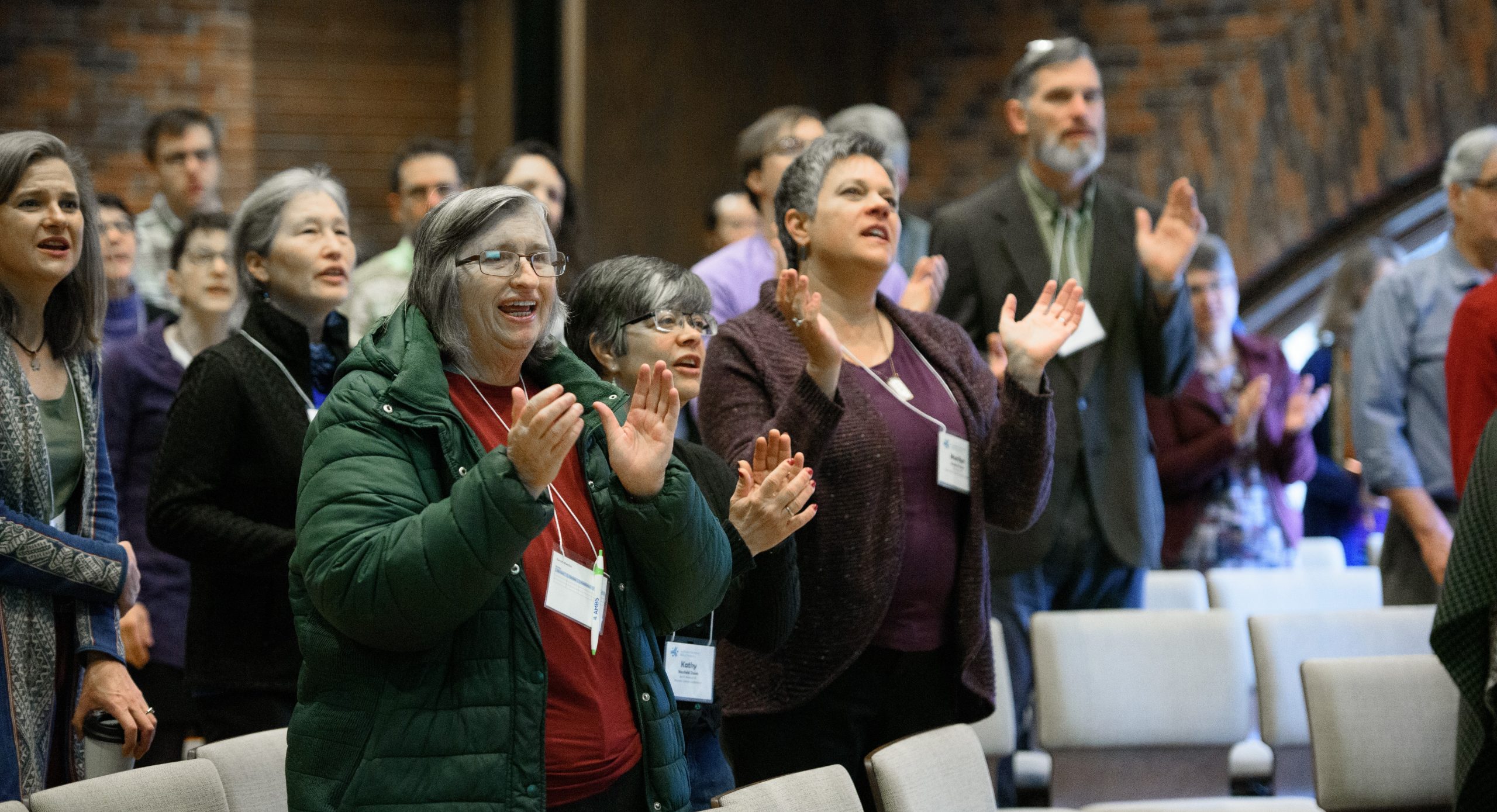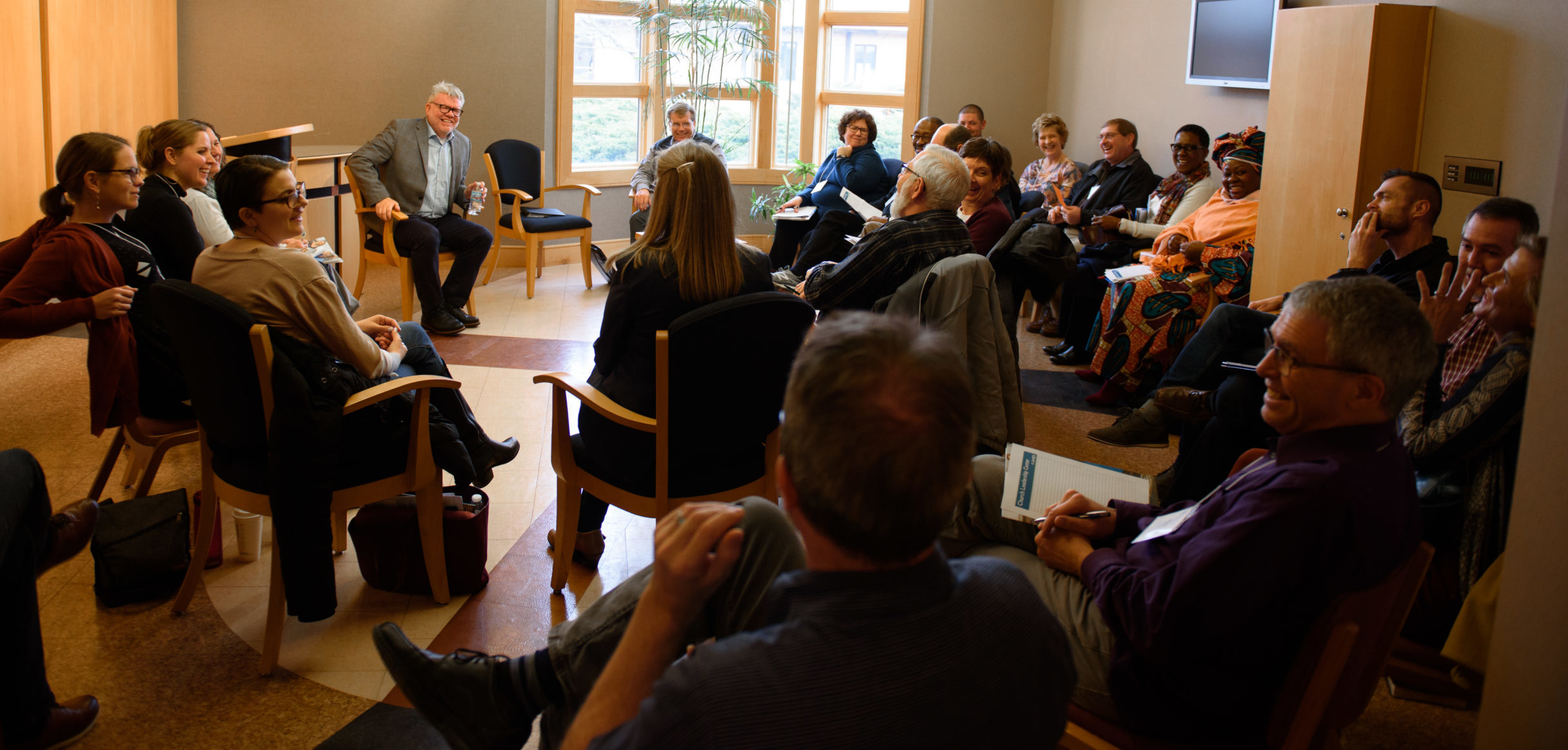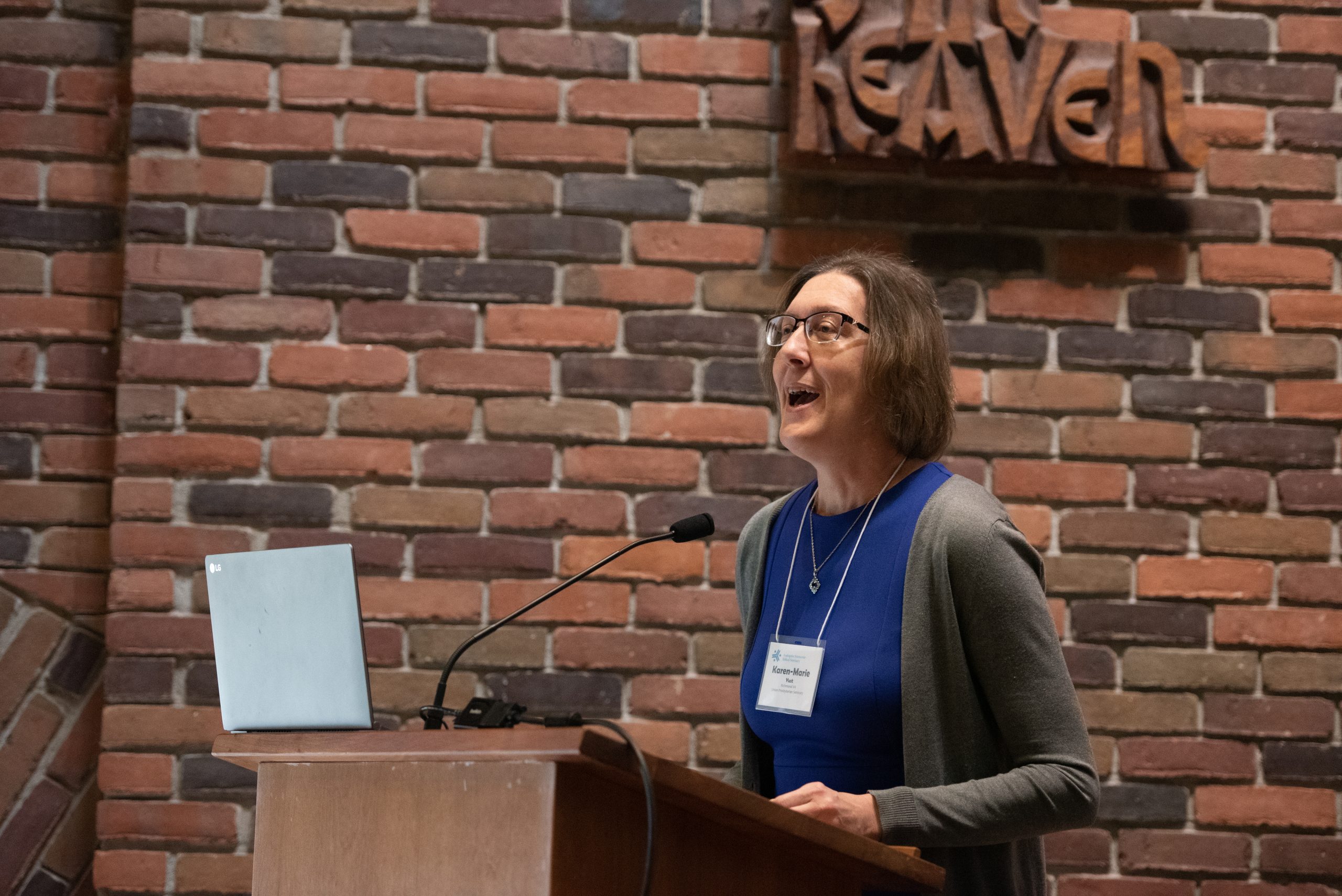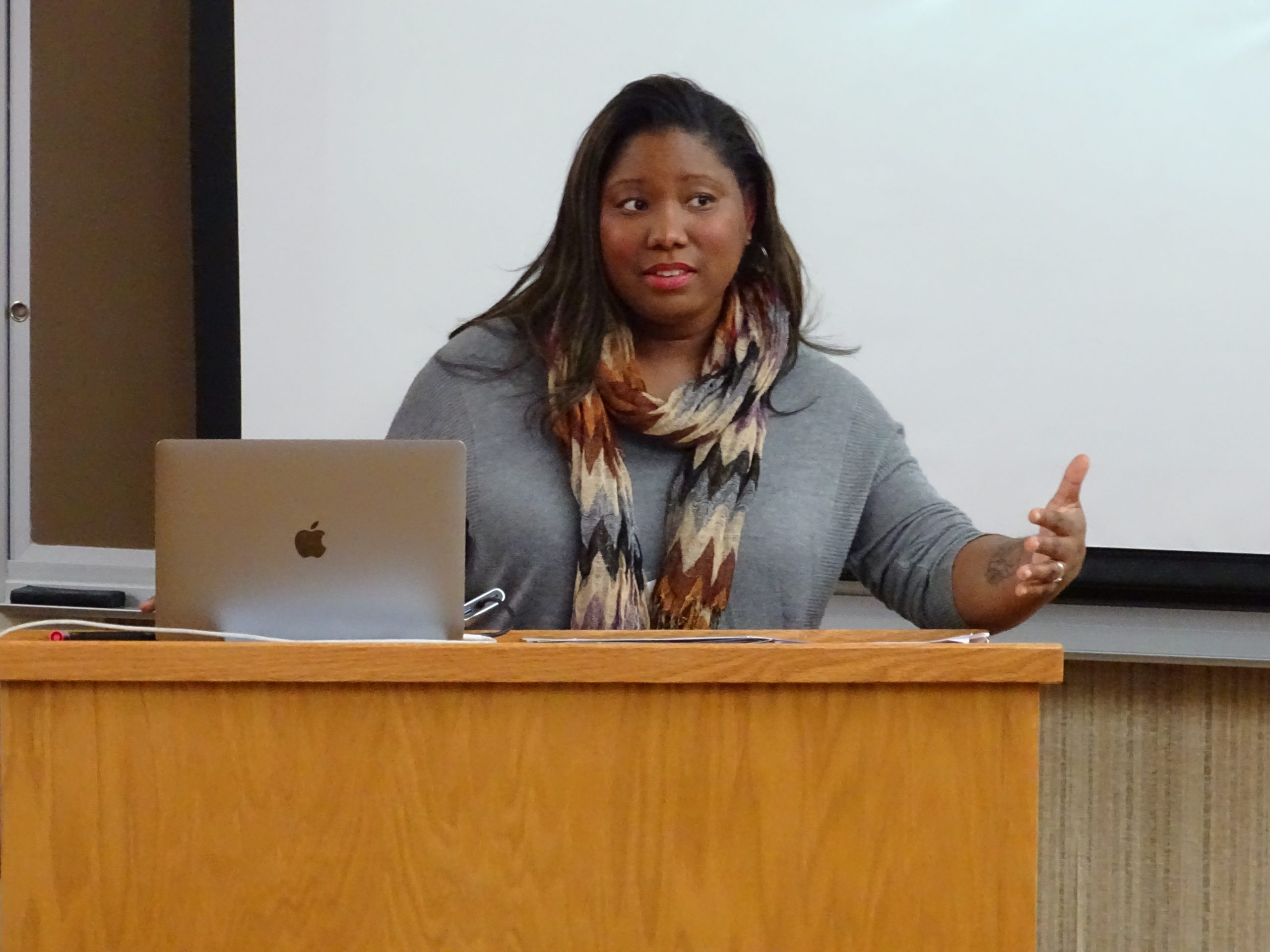
Photo by Jason Bryant.
By AMBS, Mennonite Church USA and Mennonite Mission Network staff
More than 150 Mennonite church leaders and educators gathered at Anabaptist Mennonite Biblical Seminary in Elkhart, Indiana, last week to discern the benefits and challenges of digital technology.
ELKHART, Indiana (Anabaptist Mennonite Biblical Seminary/Mennonite Church USA) — In an age when people turn instinctively to Siri for directions, Mennonite church leaders and educators found that Divine Lady Wisdom’s words from Proverbs have an amazing wealth of guidance for navigating digital culture.
Lady Wisdom, along with six fools and a wise person, emerged from the pages of the Bible to join seminary professors, church leaders and educators in guiding and challenging more than 150 participants at “Shaping Faith in a Digital Culture,” held March 2-5 at Anabaptist Mennonite Biblical Seminary (AMBS) in Elkhart, Indiana.
This was the first joint conference in which AMBS’s annual Pastors and Leaders event combined with Mennonite Church USA’s new annual Deep Faith gathering. Both conferences are designed to reach faith formation leaders.
“Our goal was to create a setting for pastors and leaders to explore how digital spaces and tools are impacting faith formation,” said Shana Peachey Boshart, denominational minister for faith formation for Mennonite Church USA (MC USA) and co-planner of the event. “We also wanted to reflect on how our faith shapes the choices we make regarding our online presence.”
“It seemed clear to us here at AMBS that the participants in both of these conferences have so many overlapping interests and concerns,” said Jewel Gingerich Longenecker, Ph.D., dean of lifelong learning at AMBS and co-planner. “We were very honored to be able to host this event with Mennonite Church USA’s office of faith formation.”
In the plenary session on Monday evening, Malinda Elizabeth Berry, Ph.D., associate professor of theology and ethics at AMBS, laid the theological foundations and modeled a process to reflect on digital culture in local congregations. Berry drew her inspiration from Cheryl Bridges Johns’ concept of orthopathy — right feeling and right orientation to the passions of God. She suggested this addition to orthodoxy (right thinking and right worshiping) and orthopraxis (right conduct and right ethics).
When Mennonites attempt to discern what to do about digital culture from a place of orthopraxis, they fall into the trap of problem-solving rather than discernment, Berry said.

Allan Rudy-Froese leading workshop on Embodied Preaching in a High-Tech Space. Photo by Jason Bryant.
During worship on Tuesday morning, Allan Rudy-Froese, Ph.D., associate professor of Christian proclamation at AMBS, modeled “embodied preaching in a digital age.” Along with worship planners Janet Abai, Jacob and Michelle Curtis, Peachey Boshart and Andi Santoso, Rudy-Froese guided conference participants in orthopathy with a “mash-up of Proverbs and digital culture.” Actors representing the Wise One and six fools — Schemer, Scoffer, Gossip, Lazybones, Glutton and Adulterer — showed that Lady Wisdom continues to have relevance in the digital age.
Karen-Marie Yust, M.Div., Th.D., professor of Christian education at Union Presbyterian Seminary in Richmond, Virginia, and the author of Real Kids, Real Faith, presented two plenary sessions on Tuesday. The first described the opportunities digital culture offers for faith formation, and the second highlighted some of the challenges of digital culture.

Karen-Marie Yust. Photo by Jason Bryant.
According to Yust, we don’t choose whether to engage with digital culture; it is a given, since most people in the United States use the internet.
“We can’t change reality, but we can change how we react to it,” Yust said. She suggested both practices of mindfulness as Christians engage digital media and ways to educate children in online resilience.
“Being mindful begins to reveal our values,” Yust said. “The alternative is wandering lost in a digital landscape that can overwhelm us.”
Yust suggested that adults can model this mindfulness as they form the lives of children and youth in their community.
“Children need to be resilient online,” Yust added. “They need to be able to take care of themselves when they are engaging online materials. … We also need them to become digital citizens so that they can use digital tools to take care of the world around them.”
Yust believes that online interactions have the potential to help teens develop agency and create space to self-regulate. She also cautioned against allowing concerns about online behavior to distract from addressing bullying and sexual harassment that happen in person in school spaces.

Osheta Moore. Photo by Annette Bergstresser.
During worship on Wednesday morning, Osheta Moore, author of Shalom Sistas, blogger and speaker, described herself as “a syndicated MennoNerd” and “an Anabaptisty Kingdom-minded woman who can’t help but talk about Jesus.” She models what Chokmah (Wisdom) looks like online as she writes about God’s universe bending toward justice and goodness. Though she was hesitant to begin blogging, seeing it as a “time suck,” after a decade of online ministry, Moore said she finds it a healing way to communicate with “the world full of hurting people looking for love. They are deeply loved by God, and they don’t even know it.”
While many Christians may be skeptical of social media because of “narcissism, vanity run amok,” Moore advocates using it for proclamation.
“The fools of Proverbs parade their selfishness, but Lady Wisdom is relational, like God,” Moore said. “We live in a scarcity culture, the culture of the fools. Wisdom counters with the abundant love of God. … Lean into [Jesus’ good news]. Make this known. Pull out your phones, Peacemakers!”
Andy Brubacher Kaethler, Ph.D., AMBS associate professor of Christian formation and culture and the plenary speaker on Wednesday, emphasized discerning whether a specific technology distorts Christian memory and Christian practices. He warned against technology that has created a new form of colonialism: the conquest and commodification of the human mind.
Brubacher Kaethler referenced Douglas Rushkoff, a media theorist, when he asked, “Is technology on ‘Team Human’?” Captology, the study of using persuasive technologies to “capture” the human mind, sees people as commodities to drive technological economy.
“If Rushkoff is right,” Brubacher Kaethler said, “whether we use social media for the purposes of faith formation or to hook up with someone on Tinder, human emotions and thought processes are being mined and exploited for financial gain in either case.”
Brubacher Kaethler posed several questions for the church to consider for discerning the extent to which it uses technology:
-
What is the problem being solved by adopting this technology? Whose problem is it?
-
Does the technology form me to expect things in life to be fast, easy and safe?
-
Does using technology help me become more deeply and positively self-aware of my body and of my emotions, or does it numb me and make me feel more negatively self-conscious and lead to self-loathing?
“Not using a technology at all is a real option if it distorts Christian memory and Christian practice. Without the real option of rejecting use of a technology, discernment is reduced to justification,” Brubacher Kaethler said.
David C. Cramer, Ph.D., managing editor of the Institute of Mennonite Studies, a sessional faculty member at AMBS, and teaching pastor of Keller Park Church in South Bend, Indiana, looked to the Amish, St. Augustine of North Africa and Immanuel Kant to seek answers on using digital technology to enhance ministry during his plenary presentation on Thursday. His resulting formula is that technology should be a means to the end of loving God and neighbors, never an end in itself. However, digital technology is designed to be addictive, Cramer said, rather than to be used selectively as a tool for ministry.
According to Cramer, the Amish evaluate technology by discerning whether the benefits gained outweigh benefits lost. They ask, “Does a new technology strengthen or diminish the community?” Also, intention trumps convenience in Amish communities. Thus, owning a car is prohibited, but accepting a ride to a distant funeral is acceptable because it allows them to comfort a grieving family.
Cramer advised church leaders and educators not to flee digital technology, but not to accept usage uncritically, either. Emojis of heart and thumbs up aren’t adequate substitutes for a pastoral visit or a phone call, he said.
Peachey Boshart said she was pleased that so many pastors and leaders came to worship and learn together.
“Our plenary speakers and preachers gave us good handles for discernment. I’m eager to hear how leaders apply their learning in their congregations,” she said.
While no participants claimed to have found definitive answers during the conference, most agreed with the assessment of Janice Wagner, lay leader at Wildwood Mennonite Church, an MC USA congregation in Engadine, Michigan:
“I’m glad I came. I leave inspired and have a lot to think about. I found all kinds of new resources that I am eager to try in my home congregation.”
The conference also included 15 workshops on topics such as Embodied Preaching in a High-Tech Space; Engaging Social Media in an Emotionally Intelligent Way; Finding True Love in a Digital Age, #MakePeace: Social Media Shalom; The Dark Side of Digital Saturation: Helping People out of Addiction to Online Pornography and Dependence Relationships; Fasting: Addressing Modern Digital Issues with Ancient Spiritual Practices; and more.
Located in Elkhart, Indiana, Anabaptist Mennonite Biblical Seminary is a learning community with an Anabaptist vision, offering theological education for learners both on campus and at a distance, including a wide array of lifelong learning programs — all with the goal of educating followers of Jesus Christ to be leaders for God’s reconciling mission in the world. ambs.edu
Mennonite Church USA is the largest Mennonite denomination in the United States with 16 conferences, approximately 530 congregations and 62,000 members. An Anabaptist Christian denomination, MC USA is part of Mennonite World Conference, a global faith family that includes churches in 86 countries. It has offices in Elkhart, Indiana, and Newton, Kansas. mennoniteUSA.org

